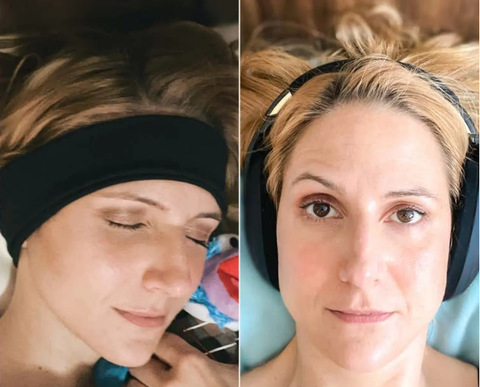How to Protect the Sleep of Infants and Elderly Parents from Noise with Disturbance Devices
Does the endless thump of your neighbor's music drive you nuts? We've been there. Sound can be the most frustrating thing that prevents people from getting a good night's sleep, as it's often difficult to control. For sensitive sleepers, noise can be one of the biggest obstacles to a good night's sleep—even when the noise comes from an understandable source.
Thoughtful family members and roommates will often refuse to watch TV if asked politely. But it's not easy to stop falling asleep to the noise of your neighbor's all-night party. I'm not suggesting that you give up trying to stop the noise at the source if you can. However, sometimes it is more productive to focus on reducing the amount of noise entering the brain when other people are controlling the source of the noise. It's always going to be tough, though, which is the main reason we recommend signal blocker.
One of the many sleep problems older adults experience throughout their lives. Long-term, chronic sleep disorders affect approximately 40 million Americans. Whether your loved one has Alzheimer's or depression, noise syndrome can be a disorder experienced by older adults that leaves them restless throughout the day. Symptoms of this condition usually occur in the late afternoon and evening. Not only can it cause your loved one to have trouble sleeping at night, but it can also lead to behavioral problems. Because of this condition, the home caregiver may experience sleep deprivation, so you may need the home caregiver to assist with care work, including monitoring the elderly at night.

And nothing looks more peaceful than a sleeping child. But even as they curl up in bed, their brains are hard at work with developmental activities like memory consolidation (the process of collating experiences, learning what's important and letting go of what's not).
"[Sleep] is critical for everyone, but especially for children who are developing both physically and mentally," says Dr. Sumit Bhargava, director of the Sleep Center for Healthy Children at Stanford. "We're learning more and more about the effects of sleep on regulating hormones. For example, in children, the period of strongest growth hormone release is shortly after the onset of deep sleep."
Noisy Environments May Also Cause Sleep Disturbances
Dr. Sumit Bhargava recommends keeping your child's room ZZZ-friendly by keeping lighting low and temperatures around 70 degrees Fahrenheit or 21.11 degrees Celsius. If noise is unavoidable, try a white noise or pink noise machine to block out some of the sound.
You may not be able to create a "noise-free" environment for your baby.
So how can you help your baby get a good night's sleep when things get a little rowdy?
A generally quiet bedroom is a sign of a good sleeping environment. Some toddlers are very sensitive to sound, and once you put her to sleep, you may find yourself walking around cautiously! One thing you can do is introduce positive white noise, such as a sound machine, box fan, or lullabies. These also block out general household noise, making it easier for your child to fall asleep.
Therefore, sleep is very important, especially for children. Sadly, just knowing your child needs a good night's sleep doesn't mean they'll get it
-
One of the most important parts of sleep hygiene is routine. When you think of routine, time and place come to mind, but sound should also be included. Sleeping should be the same every night, and white noise helps with the audio portion of this routine. It will create a unique sound environment for your child, soothe them and give them a good night's sleep.
-
If your child is having a hard time at night, it's important to figure out whether it's the noise or the nightmare.
-
If your child had nightmares or didn't sleep well the night before, you can ask them about it in the morning. If they can talk about a nightmare, you can help them come up with some alternate ending or some other imagery instead of focusing. Explain to them that nightmares are a product of their imagination and reassure them that they are safe. Sleepwalking and night terrors occur during slow-wave sleep. They occur in the first third of the sleep cycle, and the dreamer does not remember them.
This step is arguably the more dramatic one, and won't win you any friends: If your neighbors keep getting loud in disrespectful ways, you can call your local authority's noise pollution unit. This varies by country, but may be the only way to handle Sunday morning construction work or constant late night parties. Checking the laws where you live can help you prepare your case. Go online to find out when builders can use power tools, when signal phone jammer can be used, how late music can be played on the street.
Sleep problems tend to create a vicious cycle, and noise is no exception. The stress of being kept awake by the noise can itself become the worry that keeps you awake. This worry can become a reason for not being able to sleep. If the person or object making the sound gets your blood boiling and fills you with anger, that's not conducive to a good night's sleep, either. In short, it's hard to sleep when your head is full of angry thoughts. If you are a sensitive person prone to stress and anxiety, it may not be easy to let go. Try a new approach of forgiving (or at least tolerating) whoever or whatever is making the noise, and using the gps jamming device to fight back.
Mother's Day Deals
May 14-May 20, you can get 10% OFF


Comments
Post a Comment